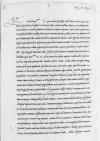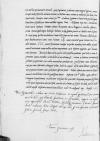Letter #815
Alfonso de VALDÉS to Ioannes DANTISCUSRegensburg, 1532-08-08
English register:
Since Dantiscus left, Valdés has had no letter from him. He wishes him to have a good trip, and not to forget those who miss him. Since Dantiscus cannot visit, Valdés asks that he write as often as possible. The emperor recovered while staying in the country and intended to come to Augsburg, but as soon as he arrived in the city he got an attack of fever so he has no intention of going back there. Valdés is well. He is angry with Dantiscus for leaving without introducing him to the other Polish envoy, who only came to him for help after long and unsuccessfully attempts to arrange matters on his own. Valdés helped him at once, but the issue was not successfully resolved – but perhaps this delay will bring in a better solution.
Valdés informs Dantiscus of the results of the Imperial Diet: all the estates of the realm are to place themselves under the emperor’s command for war against Turkey, everyone is to supply the required number of soldiers. The Saxon prince has promised the most, the landgrave of Hesse will also be there. The emperor has promised to procure the calling of a General Council within six months, and if the pope doesn’t agree – another Imperial Diet will resolve the religious matters; no changes should be made before then.
The emperor is preparing for war with Turkey, part of the army has already left for Vienna. The free cities have provided more soldiers than expected, and equipment and war machines as well. The Swiss have told the French that they refuse to fight as their mercenaries unless it is against the Turks. 8,000 Spanish soldiers and two Italian legions have come to Germany, not counting volunteers. The pope has sent the nuncio a latere, Cardinal Medici, with 400 horsemen and pay for 10,000 Hungarians. The duke of Medina Coeli, the count of Sancti Stephani have arrived from Spain, the counts of Benavente, the duke of Bagiaris, the margrave of Asturia, the count of Monteregale, a cousin of the archbishop of Toledo and numerous other aristocrats and nobles are also coming. French nobles are also expected. The fleet has set sail under Andrea Doria’s command. It includes 42 triremes, 6 carracks and 30 smaller ships, not counting pirate vessels. Apart from a crew for sea battle, there are 10,000 soldiers aboard the ships, sailing to Epirus to drive back the Turkish forces.
The Turks got wind of these preparations, have bypassed the Danube and gone off to plunder Styria and neighboring provinces. This will cause a change in the emperor’s plans.
Valdés thinks that if other Christian rulers joined the expedition, Christianity would be saved from danger. However, the emperor will do his duty. After the death of Cardinal Colonna the emperor appointed the marquis de Villafranca [Pedro de Toledo] to the office of viceroy of Naples, and the marquis left for Naples at once.
Valdés sends Dantiscus gloves of the kind the empress wears so that he can win favor with some girl thanks to this Spanish gift. Valdés passes on a request from Granvella – he wants to buy a good riding horse in Poland.
| received Cracow (Kraków), 1532-08-20 Manuscript sources:
Prints:
| ||||||||||||||||||||||||||||||||||||
Text & apparatus & commentary Plain text Text & commentary Text & apparatus
Reverendissimo Domino, domino Ioanni Dantisco, episcopo Culmensi, serenissimi regis Poloniae consiliario, etc.
Reverendissime Domine observandissime.
Ex quo a nobis discessisti, nihil litterarum abs te accepi. Iter tuum tibi feliciter successisse vehementer cupio, sed ita, ut isthaec felicitas te in oblivionem nostri non inducat. Vix credas, quanto tui desiderio tui omnes teneamur. A quo, si non expedit, ut tua nos praesentia liberes, praesta saltem, quod minimo incommodo praestare poteris, ut frequenter ad nos de rebus tuis scribas. Nullae enim litterae excipientur hic alacrius, nullae legentur avidius, quam tuae. Caesar in sua illa villa a molestissima aegritudine omnino convaluit voluitque ad nos venire, sed vixdum hanc urbem ingressus, febris eum invasit, a qua in praesentia liber est , modo redire nolit. Ego, diis gratiae, rectissime valeo, sed est, cur tibi succenseam. Reliquisti apud nos alterum ex nobilibus, quos serenissimus rex ad nos, cum tu hic adesses, miserat, et nihil mihi dixisti nec is ad me umquam venit, quousque vidit omnibus (opinor) tentatis a nobis absolvi non posse, dumque meam ad id opem imploraret. Postridie rem totam (ita, ut vides) confeci. Quae, licet non sit ex sententia, tamen haec mora meliorem aliquam condicionem afferre poterit.
Quae hic agamus, paucis praescribam. Conventus hic Germaniae his legibus dimissus est: Quod ad Romanum imperium attinet, omnes ordines se caesaris arbitrio submittunt adversus Turcas, omnes nemine excepto imperatum militum numerum suppeditabunt, quin, quod dux Saxoniae et suae factionis omnes longe magis, quam ceteri, praestare volunt et lantgravius Hassiae obtulit se venturum, modo rem caesari gratam se facturum sciat.
Quod ad religionem autem spectat, caesar pollicitus est se curaturum, ut intra sex menses generalis synodus indicatur et intra annum deinde celebretur. Quod, si forte a pontifice impetrare non possit, aliud conventum imperii se indicturum, ut quid ea in re faciendum sit, communi consilio decernatur et statuatur, et interea nihil hinc inde de facto innovari debeat. His itaque legibus conventus dissolutus est. Nunc autem caesar se ad bellum in Turcas parat. Bona Germanorum pars Viennam usque processit. Civitates liberae, a quibus vix decretum militum numerum sperabamus, aliquot milia ultra imperatum militem ad propugnandam Viennam contulere, praeter machinas bellicas aliaque ad bellum necessaria. Helvetii aperte Gallis responderunt se eorum stipendio militare nolle, nisi adversus Turcas. Milites Hispani numero octo milia Germaniam intrarunt, quos sequuntur Italorum duae integrae legiones, praeter eos, qui nullo stipendio conducti currunt ad bellum tanto animo, ut nullus sit, qui domi se continere vel{l}it. Pontifex misit ad nos cardinalem Medicem legatum a latere cum quadringentis equitibus et stipendio pro decem milibus Ungaris. Venit ex Hispania usque dux Metinae Celi, comes Sancti Stephani, veniunt comites Beneventi, dux Bagiaris, marchio Astoricae, comes Montis Regalis nepos archiepiscopi Toletani et alii quamplures proceres ac nobiles totius Hispaniae, et ex ipsa quoque Gallia non dubitant huius belli fama ad nos venire. Praeterea classis nostra sub duce Andrea Doria exivit: sunt triremes XLII, naves onerariae, quas carracas vocant, sex, aliae minores XXX praeter piratarum navigia, in quibus navibus praeter milites ad proelium navale necessarios decem milia militum imponuntur, ut in Epirum traiciant, quo Turcarum vires divertant. Turcae autem, dum vident, quae a nobis praesidia parantur, quae vires et arma disponuntur, omisso Danubio (veluti hodie ad nos allatum est) Stiriam et finitimas provincias depopulaturi properarunt. Ita et nobis mutandum consilium erit. Quod, si nunc ceteri Christiani principes suas vires caesarianis adiungere vellent, facile rempublicam ab hoc metu liberare possemus, sed non propterea omittet caesar, quin suum officium faciat. Viden, quam maximam tibi historiam narravi, non dubitans haec tibi gratissima futura. Defuncto cardinale Colonna caesar instituit viceregem Neapolitanum marchionem Villaefranchae, qui recta Neapolim profectus est.
Chirothecas ex his, quas imperatrix nostra ferre solet, cum his ad te mitto, ut si forte in aula puellam (ut soles) ambire coepisti, Hispanico munere eam allicias.
Vale.
Ratisponae, VIII Augusti 1532.
Postscript:
Dominus Granuella voluit, ut ad te scriberem, se equum gradarium (ut vocant) ex vestris habere velle, qui blande incedat ac firmiter. Rogat, ut cum primum erit opportunum, ad eum mittas simulque moneas, cuinam pecuniam dare debeat. Haec scripsi non ex animo, sed ut homini amicissimo fidem servarem.
Iterum vale.
Tuus, quantus est, Valdesius


